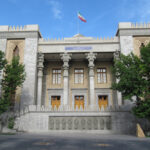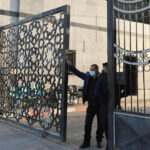Heartbroken mother weeps over the coffin of Hamas hostage Noa Marciano after she and another were found dead in hospital complex where Israel is searching for Hamas HQ
The heartbroken mother of a soldier held captive by Hamas terrorists today wept over her daughter’s coffin after the 19-year-old and another hostage were found dead in Gaza’s Al-Shifa hospital complex.
Overcome with grief, Adi Marciano broke down in tears as she placed her hand on her daughter Noa’s coffin during an emotional service for the soldier in the central Israeli city of Modiin.
Adi, crumpling under the weight of her grief, collapsed on top of the wooden coffin where her daughter lay. Noa’s friends and fellow comrades sobbed and held each other as they watched the coffin, covered with an Israeli flag, pass through the large crowd of devastated mourners.
The heartbroken mother had been told earlier this week that Noa, of the Combat Intelligence Collection Corps, had been killed after Hamas released a horrific video showing what appeared to be the 19-year-old’s dead body.
Adi, who described Noa as a ‘girl of light and love’ and beloved big sister to her three siblings, had waited in anguish for news that her daughter’s body had been found.
That news came today, with the IDF confirming they had found the remains of Noa and another hostage Yehudit Weiss, 64, from a building adjacent to the hospital where Israeli soldiers are searching for a Hamas command centre.
Noa was laid to rest today in an emotionally charged funeral service, with her weeping friends and family consoling each other as they paid tribute to the young soldier.
During the hospital raid in which Israeli troops found Noa and Yehudit’s bodies, the IDF claimed its forces also found a tunnel shaft used by Hamas terrorists.
The IDF released a video it said showed a tunnel entrance in an outdoor area of Al-Shifa hospital, two days after Israeli troops entered its grounds to hunt for a Hamas command centre they say is beneath the medical facility.

‘We had strong indications that they were held in the Shifa Hospital, which is one of the reasons we entered the hospital,’ he told CBS Evening News. ‘If they were (there), they were taken out.’
Israeli troops claimed they found a tunnel entrance and weapons inside a truck located in the compound – but the military has yet to release evidence of a central Hamas command centre that Israel has said is concealed beneath the complex. Hamas and staff at the hospital, Gaza’s largest, deny the allegations.
IDF troops belonging to the Shaldag Unit, the 7th Brigade, and additional special units are continuing to conduct targeted activity in the Al-Shifa Hospital.
On Wednesday the IDF revealed evidence of weaponry which it said proved the hospital was a terrorist base, with spokesman Lt Col Jonathan Conricus showing a duffel bag containing an AK47 assault rifle, grenades and ammunition.
It comes as the Israeli military said on Friday its troops had recovered the remains of kidnapped soldier Noa, 19, ‘from a structure adjacent to Al-Shifa hospital’.
The army had confirmed earlier this week the death of Noa, without giving the cause. Hamas had issued a video of the young soldier alive followed by images of what the terrorists said was her body after she was killed by an Israeli strike.
In the Hamas video, disseminated on social media on Monday, Noa identified herself on camera.
She said she had been held in Gaza for four days, indicating it was taped on October 11 – four days after Hamas’s October 7 incursion into southern Israel.
The video then shows still pictures of a young woman of similar appearance lying, looking sallow and with her eyes closed, on a blood-stained bedsheet.
A caption over the video clip – which has been shared widely on social media – said Marciano was killed ‘in an air strike by the Zionist enemy’ last Thursday. MailOnline has chosen not to show the video. The military statement did not comment on the circumstances of Marciano’s death. Meanwhile, on Thursday the army said soldiers near Al-Shifa had found the body of another hostage – Yehudit Weiss, 65.

Ms Weiss was kidnapped from her home in the border kibbutz community of Beeri, one of the areas worst-hit by the brutal Hamas assault.
Her husband Shmulik Weiss was found murdered in their safe room.
Troops of the 7th Armored Brigade’s 603rd Battalion found the body, along with Hamas military equipment – including assault rifles and RPGs in a building ‘adjacent to Shifa Hospital’, according to the IDF.
The body was brought back to Israel for identification, after which the military and police notified Ms Weiss’s family of her death.
Israeli officials say around 240 people were taken hostage during the Hamas attacks which killed some 1,200 people, mostly civilians.
The IDF did not provide further details on Ms Weiss’s cause of death, or when she was killed. It is believed she was undergoing treatment for cancer when she was seized by the terrorists.
‘The IDF sends its heartfelt condolences to the family,’ it said in a statement. ‘The national mission… is to locate the missing and return the hostages home.’
‘The IDF is operating alongside and in full coordination with the relevant national and security institutions in order to pursue these tasks. We will not cease from the mission until it will be completed,’ the IDF added.
Israel’s Defence Forces previously suggested it could take ‘a few weeks’ to uncover ‘the extent’ of Hamas’s command centre beneath Al-Shifa hospital, as hundreds of commandos continue to search through every building and floor of the complex.
Footage ‘relating to hostages seized by Hamas’ was found on computers at the hospital, the IDF has said, as well as a cache of weapons belonging to the terrorists.
The United Nations is now desperately looking into how it could evacuate the hospital, which is the biggest in the Gaza Strip, but says its options are limited by security and logistical constraints, a senior World Health Organization official said.
It comes as Netanyahu admitted efforts to prevent civilian deaths were ‘not successful’ – but blamed Hamas for stopping people from moving to safer places.
When asked whether Israel’s killing of thousands of Palestinians in its almost six week war against Hamas militants would fuel hatred among a new generation, Netanyahu said attempts to minimise civilian casualties were ‘not successful’.
‘Any civilian death is a tragedy. And we shouldn’t have any because we’re doing everything we can to get the civilians out of harm’s way, while Hamas is doing everything to keep them in harm’s way,’ Netanyahu said.

‘So we send leaflets, call them on their cell phones, and we say: ‘leave’. And many have left,’ he said.
Meanwhile, Palestinian telecoms provider Paltel said a lack of fuel means all communications services are down across the besieged enclave, which has been subject to a blockade and relentless bombing campaign by Israel for weeks.
The communications blackout largely cuts off Gaza’s 2.3 million people from one another and the outside world – and paralyzes the coordination of aid, which humanitarian groups were already struggling to deliver because of the fuel shortage.
Since the war began, Gaza has received only 10 per cent of its required food supplies each day, and dehydration and malnutrition are growing with nearly all residents in need of food, said Abeer Etefa, a Mideast regional spokeswoman for the United Nations’ World Food Program.
‘Food production has come to an almost complete halt, markets have collapsed, fishermen cannot access the sea, farmers cannot reach their farms,’ she said Thursday from Cairo. ‘People are facing the immediate possibility of starvation.’
The breakdown of the communications network only worsened the situation. The U.N. agency for Palestinian refugees, or UNRWA, said no aid deliveries would be able to enter from Egypt on Friday because of the difficulties coordinating them without phones or internet.
‘We have seen fuel and food and water and humanitarian assistance being used as a weapon of war,’ said agency spokesperson Juliette Touma. It is ‘outrageous that humanitarian agencies are reduced to begging for fuel.’
Fuel is needed for electricity generators that run everything from communication systems to water and sewage pumps.





